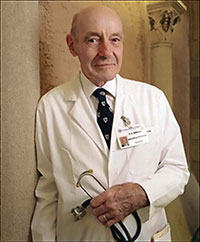History
The University of Rochester Aging Institute (URAI) has been designed collaboratively over the past several years with input and representation from a multitude of stakeholders in aging and geriatrics across University schools and campuses and the Rochester community. A comprehensive needs assessment conducted in 2017 validated plans to create the URAI and identified the Institute’s role as the ultimate convener of all parties and individuals committed to work in aging, promoting collaboration, discovery and innovation.
The URAI provides a framework for collaboration related to three pillars of strength: Vital Discovery (research), Vital Care (health services) and Vital Living (community collaboration) across the entire University and Greater Rochester region. The URAI is designed to resonate with both stakeholders and consumers, including Rochester’s older adult population as is reflected in our Mission and Vision Statements.
T. Franklin Williams—A Geriatrics Pioneer
 T. Franklin Williams, M.D., was a founding father of the field of geriatric medicine in the United States and a mentor for generations of geriatricians and geriatrics academic leaders across the country. Dr. Williams, a professor emeritus of Medicine at the University of Rochester Medical Center and medical director of Monroe Community Hospital, was the second director of the National Institute on Aging (NIA) of the National Institutes of Health, serving from 1983 to 1991. Through a research and teaching career of 40 years in Rochester and his administrative leadership, Dr. Williams role-modeled successful aging and advanced aging issues and patient-centered geriatrics care.
T. Franklin Williams, M.D., was a founding father of the field of geriatric medicine in the United States and a mentor for generations of geriatricians and geriatrics academic leaders across the country. Dr. Williams, a professor emeritus of Medicine at the University of Rochester Medical Center and medical director of Monroe Community Hospital, was the second director of the National Institute on Aging (NIA) of the National Institutes of Health, serving from 1983 to 1991. Through a research and teaching career of 40 years in Rochester and his administrative leadership, Dr. Williams role-modeled successful aging and advanced aging issues and patient-centered geriatrics care.
"Frank Williams was a giant in the field, but as a resident I didn't know that," said Rosanne Leipzig, M.D., professor of Geriatrics at Mount Sinai Hospital in New York City who trained under Dr. Williams. "He was simply an extraordinary role model who led by example and taught all of us that there was art and a lot of science in providing good care to older adults. Many of the current leaders in and supporters of American geriatrics have a significant Rochester connection; this is due to Frank and his infectious love of the field and the patients."
Read More Dr. Williams' Life and Contributions to Geriatric Medicine